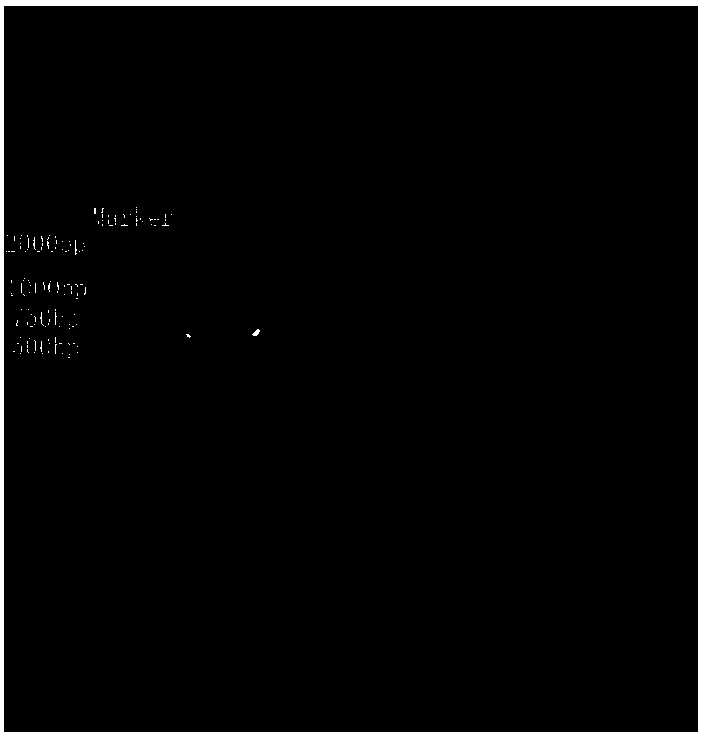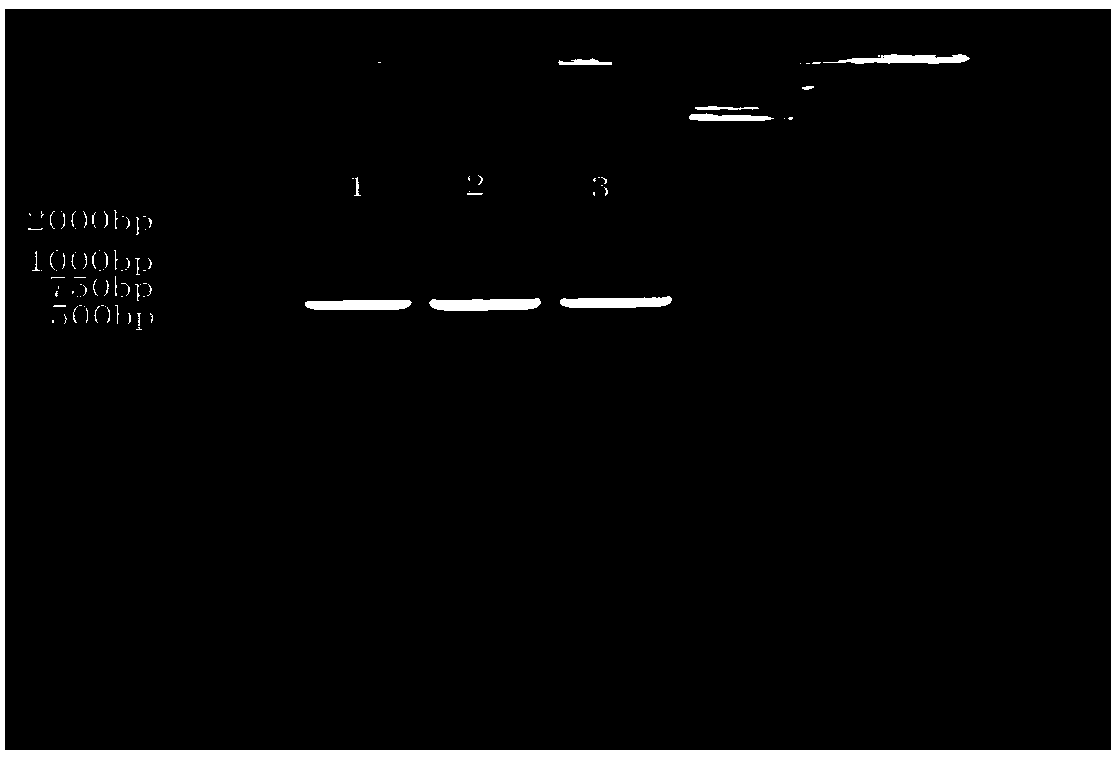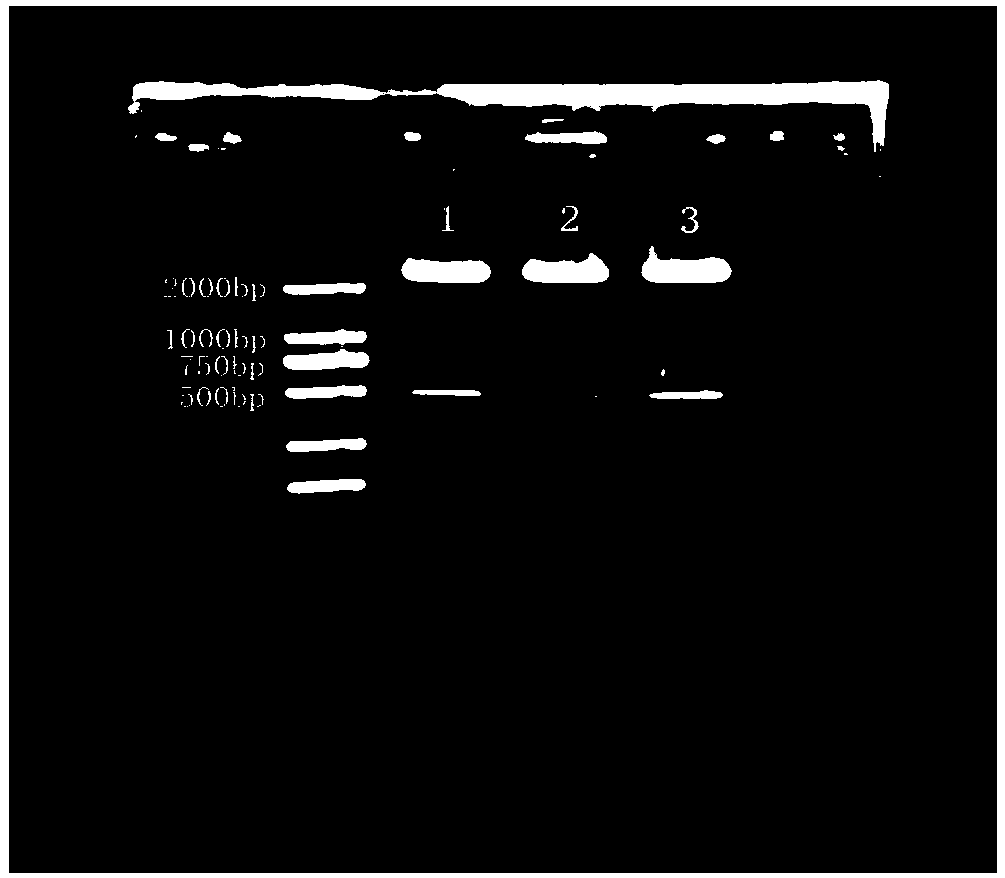Creation and application of heavy metal super-enriched genetically-engineered oryza sativa genetically modified with Pteris Vittata PvACR2 gene
A technology of transgenic engineering and heavy metals, applied in genetic engineering, application, plant genetic improvement and other directions, can solve the problems of special growth environment, heavy metal return, limited tolerance, etc., and achieve good genetic transformation effect, high expression, and broad application prospects. Effect
- Summary
- Abstract
- Description
- Claims
- Application Information
AI Technical Summary
Problems solved by technology
Method used
Image
Examples
Embodiment 1
[0047] Example 1 PvACR2 gene cloning
[0048] Use liquid nitrogen to grind centipede grass seedlings into powder, use Trizol method to extract its RNA, use TOYOBO reverse transcription kit to reverse transcribe it into cDNA, and use Primer5 to design its upstream and downstream primers according to the cDNA sequence of PvACR2 gene provided by NCBI , and synthesize primers, the nucleotide sequence of the designed primers is:
[0049] Upstream sequence: 5'TAGAAGACTAGAAGAACG 3' (as shown in SEQ ID NO: 2);
[0050] Downstream sequence: 5'AGCGACGACTAGACGAAAGC 3' (shown in SEQ ID NO: 3). After the primers are synthesized, use 1×TE to dissolve, then carry out PCR amplification, using the cDNA of Centipede grass as a template, using high-fidelity enzymes GXL Premix amplifies it, uses 1% agarose gel to electrophoresis the amplified product, excises the target band (2491bp), and recovers it using a gel recovery kit. The electrophoresis of the amplified product is as follows figure 1...
Embodiment 2
[0051] The construction of the transformation vector of embodiment 2 heavy metal hyperaccumulation transgenic plants
[0052] (1) The construction of the transformation vector containing Ubiquitin promoter, Bar screening gene and 3×Flag tag is based on the laboratory’s own pCAMBIA1301-3×Flag vector, which is obtained after transformation through the following steps:
[0053] ① Obtaining the Bar screening gene: the pCAMBIA3301 vector contains the Bar screening gene and the CaMV35S promoter. In this example, the CaMV35S promoter that comes with the pCAMBIA3301 vector is used to start the Bar screening gene, which can enhance the efficient transformation of the target gene. The CaMV35S promoter core The nucleotide sequence is shown in SEQ ID NO:9. The pCAMBIA3301 vector was cut with Xho I endonuclease, the digested product was subjected to 1% agarose gel electrophoresis, and a small band (608bp) was recovered. Homologous recombination primers were designed according to the pCAMB...
Embodiment 3
[0064] Example 3 PvACR2 gene overexpression binary vector of heavy metal hyperaccumulation transgenic plants
[0065] Design homologous recombination primers according to the two ends of the ORF region of the PvACR2 gene, and the nucleotide sequence of the designed homologous recombination primers is:
[0066] Upstream sequence (shown as SEQ ID NO: 12):
[0067] 5'TTCTGCAGGTCGACTCTAGAGGATCCATGGCCTCGCTTCCATCCCTCT3';
[0068] Downstream sequence (shown as SEQ ID NO: 13):
[0069] 5'TTATTTATGGAGAAACTCGAGTCAAATCTCGGTGACGGGCA 3'.
[0070] The 19T vector containing PvACR2 was used as a template for PCR amplification with high-fidelity enzymes. The PCR product was subjected to electrophoresis on 1% agarose gel, and the target band was recovered for future use. The constructed pUb-3×Flag-Bar transformation vector and p2×CaMV35S-HYG transformation vector were respectively digested with BamH I, and the digested products were directly gel-recovered for future use. Carry out homologo...
PUM
 Login to View More
Login to View More Abstract
Description
Claims
Application Information
 Login to View More
Login to View More - R&D
- Intellectual Property
- Life Sciences
- Materials
- Tech Scout
- Unparalleled Data Quality
- Higher Quality Content
- 60% Fewer Hallucinations
Browse by: Latest US Patents, China's latest patents, Technical Efficacy Thesaurus, Application Domain, Technology Topic, Popular Technical Reports.
© 2025 PatSnap. All rights reserved.Legal|Privacy policy|Modern Slavery Act Transparency Statement|Sitemap|About US| Contact US: help@patsnap.com



